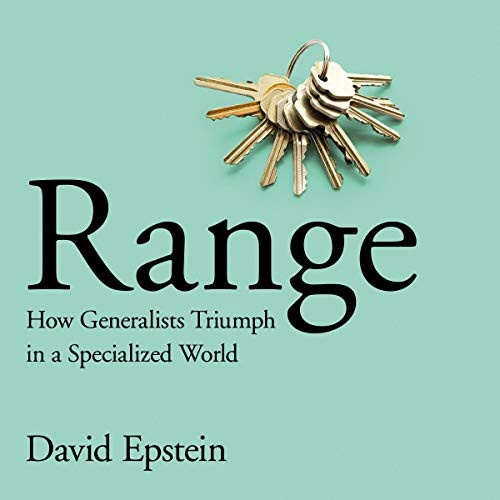Excerpts from Range: Why Generalists Triumph in a Specialized World
One of my favorite “hacks” is re-typing highlighted portions of non-fiction I’ve read. The process of highlighting once then re-reading and re-typing later tends to lock concepts into memory for later retrieval when it’s most useful.
Below are my re-typed notes from David Epstein’s recent book Range, which I found to be extremely interesting and instructive. The many stories and research challenge some of the well-accepted approaches people take in training and development — both for children and adults.
Epstein’s premise is that performance improves by recognizing and adapting to patterns in your environment. (Think: patterns in how to navigate office politics, work through a customer’s buying process, or hit 100 mph fastball.)
*******************************************
The domains in which [economist Daniel] Kahneman and [psychologist Gary] Klein studied, in which instinctive pattern recognition worked powerfully, are what psychologist Robin Hogarth termed “kind” learning environments. Patterns repeat over and over, and feedback is extremely accurate and usually very rapid. In golf or chess, a ball or piece is moved according to rules and within defined boundaries, a consequence is quickly apparent, and similar challenges occur repeatedly. Drive a golf ball, and it either goes too far or not far enough; it slices, hooks, or flies straight. The player observes what happened, attempts to correct the error, tries again, and repeats for years. That is the very definition of deliberate practice, the type identified with both the ten-thousand-hours rule and the rush to early specialization in technical training. The learning environment is kind because a learner improves simply by engaging in the activity and trying to do better. Kahneman was focused on the flip side of kind learning environments; Hogarth called them “wicked.”
In wicked domains, the rules of the game are often unclear or incomplete, there may or may not be repetitive patterns and they may not be obvious, and feedback is often delayed, inaccurate, or both.
My note: Most of the highest value human skills are necessary in a wicked environment, like negotiating a deal, delivering a presentation, building trust, or having a difficult conversation.
Savants have more in common with prodigies. Their brilliance relies on repetitive structures, which is precisely what made the Polgars’ [chess prodigies] skill so easy to automate.
In 2019 a limited version of StarCraft, AI beat a pro for the first time. But the game’s strategic complexity provides a lesson: the bigger the picture, the more unique the potential human contribution. Our greatest strength is the exact opposite of narrow specialization. It is the ability to integrate broadly. (Emphasis mine)
Their skill [that of high achievers] was in avoiding the same old patterns. In the wicked world, with ill-defined challenges and few rigid rules, range can be a life hack.
My note: The key is to develop a set of “conceptual schemes” or patterns that tend to work well across various situations. Examples of conceptual schemes would be: a sales process, a strategic planning methodology, principles of human relationships, or laws of thermodynamics.
Conceptual schemes are flexible, able to arrange information and ideas for a wide variety of uses, and to transfer knowledge between domains. Modern work demands knowledge transfer: the ability to apply knowledge to new situations and different domains. Our most fundamental thought processes have changed to accommodate increasing complexity and the need to derive new patterns rather than rely only on familiar ones. Our conceptual classification schemes provide a scaffolding for connecting knowledge, making it accessible and flexible.
Breadth of training predicts breadth of transfer. That is, the more contexts in which something is learned, the more the learner creates abstract models, and the less they rely on any particular example. Learners become better at applying their knowledge to a situation they’ve never seen before, which is the essence of creativity.
Learning deeply means learning slowly.
*************************************************
Where could you develop a greater range in your work and life? Perhaps the place to start is to recognize that your most important work most likely happens in a wicked environment. Your best bet is to 1) broaden your experience and 2) formulate conceptual schemes that can be applied across disciplines.










Comments are closed here.